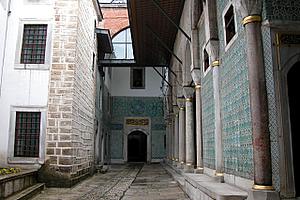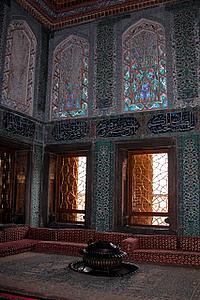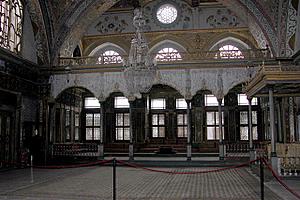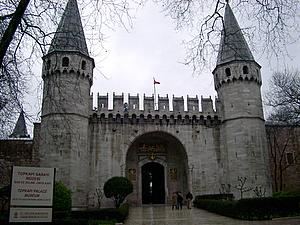Whilst we are talking about insects: spotted by webmaster Paul, US Entomologists Quentin Wheeler and Kelly B. Miller recently had the task of naming 65 newly discovered species of slime-mold beetles and named three species after the US president George W Bush, vice president Dick Cheney and defence secretary Donald H Rumsfeld. The newly found beetles are respectively called: Agathidium bushi Miller and Wheeler, Agathidium cheneyi Miller and Wheeler, and Agathidium rumsfeldi Miller and Wheeler. Naming the beetles after Bush, Cheney and Rumsfeld was intended to pay homage to them, said Wheeler, who taught at Cornell University for 24 years and now is with the Natural History Museum in London.
Category Archives: enewsletter
A Little Part of Istanbul
When Sultan Mehmet the Conqueror took over Istanbul in 1453, he first ordered the construction of a new palace for this new Ottoman capital, on a site in the district of Beyazit where Istanbul University stands today. Then he changed his mind and had a number of buildings constructed on the headland which was an olive grove to the southeast. It is these buildings that became the Topkapi Palace. The Topkapi Palace was the home to all the Ottoman sultans until the reign of Abdulmecid I (1839-1860), a period of nearly four centuries. The final form of the first palace covered an area 700m², and was enclosed with fortified walls 1400 meters in length. The walls had a number of gates, namely the Otluk gate, the Demir gate and the Imperial Gate and a number of minor angled gates between them. After the reign of Mehmet, the palace grew steadily to form a city like complex of buildings and annexes, including a shore palace known as the Topkapi shore palace, as it was situated near the cannon gate -Topkapi- of the ancient walls of Istanbul. When the shore palace was burned down in 1863, it lent its name to the great complex we now know as Topkapi Palace.
The Topkapi Palace continued to be the principal residence for four centuries until in 1853, Sultan Abdul Mecid I moved into the new palace of Dolmabahce on the Bosphorus. The old palace was used as house for the women of the departed sultans and their servants until the Harem was officially disbanded in 1909. In 1924, Topkapi Palace was converted to a museum on instructions of Mustafa Kemal Ataturk. The final step was the opening of the Harem to the public in 1960.
Because Topkapi is the first attraction to tick off on everyone's list get there when it opens, so get there early. The Topkapi Palace Museum is open between 9:00 am-5:00 pm everyday except for Tuesdays. Tickets can be purchased in the gateway to the Second Court. The tickets cost 12.000.000 TL. (equivalent to about 8 USD or 7 EUR) per person. The treasury section needs a separate admission fee and costs 10.000.000 TL. There is a discounted fee for the students. The Harem Section can be visited with a separate ticket in the ticket office near the Harem entrance. The tours to Harem are operated every half hour from 9:30 am to 4:00 pm. The tickets cost 15.000.000 TL(11 USD or 9 EUR).
Go straight to the Harem, which can only be seen by guided tour, as the tours fill up early. After the Harem tour you can stroll around the palace's grounds and the four courtyards at your leisure. Also, don't miss the Treasury in the 3rd courtyard which houses gold, and works of art.
Straight after the Topkapi Palace, head for the Aya Sofia and the Blue Mosque which are virtually next door.

Courtyard of the Eunuchs

A room in the harem

Topkapi Imperial Hall, Harem

Topkapi Gate
New Resting Place for Nelson's Sailors
The bodies of 30 British soldiers and sailors and their families, who died during Nelson’s Nile campaign more than 200 years ago were discovered on the small island by an Italian archaeologist looking for Greek and Roman artefacts. The old graves were in danger of being washed away as the sea eroded the island. The remains were reburied at the Military and War Memorial Cemetery at British families cemetery, Al-Shatby in Alexandria with full families honours during a recent ceremony. One of the dead’s descendent Gordon Watson, 87, from Hampshire, and his 83-year-old wife, Joan, travelled to Egypt for the ceremony. After the ceremony, Mr Watson said: “It’s marvellous to be related to this man … It makes you proud to be English.”
Gettysburg a Civil War Battlefield by Susan Velasquez
A visit to Gettysburg will take you back in time, where you can almost hear the ghosts of the civil war soldiers and, louder still, the cannons still bursting in air.
The immense area must be covered by bus or private car. Get a map at the information centre and then follow the route around the site. When you arrive at a site that you want to take a closer look at there are plenty of parking areas or simply stop the car on the side of the road as they have wide shoulders. Each battlefield has a plaque explaining the regiments that fought there, and details such as the dates and the number of casualties. You will be moved by the number of huge monuments dedicated to the soldiers from each state and by the passionate wording and sheer numbers of dead from the various battles.
After viewing these monuments and (through a local guide) hearing or reading about what took place there, you can almost feel what it must have been like to be a young soldier thrown into battle, only to be slaughtered by the other side. It really brings home the horrors of war and the incredible courage of the men fighting them. The fact that now these places are lovely and peaceful fields that have been preserved in their memory is moving. Unfortunately though, not all the fields are being saved as the modern world is slowly crowding in on the area. Motor vehicle dealerships and commercial buildings are taking over some of the fields there, which is an absolute shame.
You can also spot wild life in some spots, like a group of deer that we came across. The deer are so used to the cars that they won't stop before crossing roads. So you have to drive slowly and carefully, especially when turning corners. In a particularly graphic field, there is still an old house that was bombed during one of the battles and still has a large hole in the front, which clearly shows the dangers of living in the area at the time. A guide explained that in a nearby field there was basically a total slaughter of the soldiers and the field was littered with bodies, and the stench could be smelled for weeks. There are also tales of ghosts being seen in the area at night as well as strange noises.
So for a truly moving experience and a lesson on one of the more unflattering periods in American history, visit Gettysburg, Pennsylvania.
Snails Big Business in Bosnia
Did you know that there are estimated to be around 300 snail farms in former war torn Bosnia? One kilogram of snails is sold for four around euros (£2.70). France is the number one export destination, followed by Italy. The aim is for a snail farmer to produce around 3,000kg of snails in a year. That means an annual income of around 12,000 euros (£8,100) – around four times the national average wage. The British chief international envoy to Bosnia, Lord Ashdown, has made a priority of trying to encourage small businesses. He set up a so-called “Bulldozer” committee to smash through the red tape and old-style communist legislation that hindered the setting up of new companies. “Small and medium-size firms, like snail farms, represent the future of this country rather than the old pre-war industries, which are not coming back,” says Vedran Persic from Lord Ashdown’s office.
MEETING NEWS
Meeting news from our branches around the world.
Country Statistics: Lowest Population Density
Want to get away and escape the crowds?
LOWEST POPULATION DENSITY2 (per sq mi): 2004
- Western Sahara – 2.6
- Mongolia – 4.6
- Namibia – 6.1
- Australia – 6.7
- Botswana – 6.7
- Suriname – 6.9
- Iceland – 7.4
- Mauritania – 7.5
- Libya – 8.3
- Canada – 8.4
Source: http://www.infoplease.com/ipa/A0762380.html
New Necropolis Found
A joint A US and Egyptian archaeological team say they have found the largest funerary complex yet dating from the earliest era of ancient Egypt, more than 5,000 years ago in the Kom al-Ahmar region, around 600 km (370 miles) south of the capital, Cairo. Inside the tombs, the archaeologists found a cow’s head carved from flint and the remains of seven people. They believe four of them were buried alive as human sacrifices. The complex is thought to belong to a ruler of the ancient city of Hierakonpolis in around 3600 BC, when it was the largest urban centre on the Nile river.
Write for the Globetrotters monthly eNewsletter
If you enjoy writing, enjoy travelling, why not write for the free monthly Globetrotters eNewsletter! The Beetle would love to hear from you: your travel stories, anecdotes, jokes, questions, hints and tips, or your hometown or somewhere of special interest to you. Over 8,000 people currently subscribe to the Globetrotter e-news.
To see your story in cyber print, e-mail the Beetle with your travel experiences, hints and tips or questions up to 750 words, together with a couple of sentences about yourself and a contact e-mail address to Beetle@globetrotters.co.uk
Mac's Travel Tips
 We are sorry to say that Mac is not very well, but he is still
e-mailing strong and recently sent the Beetle a collection of
travel reminiscences about Japan and shopping in Hong Kong.
We are sorry to say that Mac is not very well, but he is still
e-mailing strong and recently sent the Beetle a collection of
travel reminiscences about Japan and shopping in Hong Kong.
When I was first stationed in Japan, the Chaplains would have to counsel Japanese girls that wanted to marry GIs. They would explain to them that they might get homesick in the States so far from their homeland Japan, that customs were different in the States etc etc. One Chaplain told me that the Japanese girl he was counselling got tired of all his little talk and said to him: look here Chaplain, I want to go to the States. I no bullshit you. Ha!
I was stationed in Japan for five and a half years and loved it and it showed in my letters home. I must have gone to Hong Kong from Japan at least a dozen times on our planes. Planes leaving Japan would often stop in Hong Kong no matter what their destination especially at Christmas time. I got to be kind of an unofficial shopper for those that could not leave the base of Japan and this included buying Rosewood furniture for the Commander who was soon to leave for the States. I had to get it on one of our ships returning to Japan and get it thorough customs in Japan. A buddy of mine Nesi met me to act as my interpreter. The customs asked my buddy if I was Important. He told them in Japanese. You dam right he is. He is a Sergeant. (Low Sergeant, however, TSgt.)
We were supposed to be checking weather and intelligence but shopping entered into things. One time I was proudly walking down Nathan Road in Hong Kong in my new Hong Kong shoes when the soles fell off. I bent over to pick them up and my new Hong Kong suit ripped down the back. Chinese thread was not strong and Americans learned in the future to bring American thread to their tailors and hope they would use it.
You got a tailor made suit with two pairs of pants for $25 in 24 hours. Our crew usually stayed in modest hotels, either in the Golden Gate or the Peninsula. They knew our needs, so much so that when sometimes we had to leave early, they would store stuff for us between trips etc. One time, my roommate was a new man in our outfit. We entered our room and three Chinese followed into our room. My buddy said: Mac, who are these folks? I said I don't know. I thought they were with you. They were what we called tailor pimps who tried to get you to go to their tailor shop. They would give you a drink while about three people would be measuring you. You felt like a King. The first time they asked me how I dressed. Are they making conversation? I first put on underwear, then trousers, then shoes. No do you dress left of right? An old timer said to me: Mac they want to know which way your dong hangs to the left or the right so they can arrange material to hide it. I said as far as I know it just hangs and it isn't that big. I have trouble finding it. Ha! The tailor pimps were better informed that our intelligence. They would know our commanders name, when we were arriving in Hong Kong and when we were to leave. One time in a hotel, what we thought was the front desk phoned and said for us to have our luggage out in the hallway by three o clock instead of four. It was a con artist phoning. Our luggage was picked up and there went our Hong Kong suits, souvenirs, military clothing. The works.
AFRH-W Stanley Sagura collects used eye glasses and volunteers to go with a group including eye doctors to distribute them free to needy around the world. I enjoy hearing about his travel experiences. He was with a group of 38 in a tour that were taken to the largest McDonalds in the world in Beijing, China. (Some had gotten tired of eating Chinese food!) This McDonalds had 300 employees. Stanley counted 30 cash registers. They all ordered the same items in advance and were taken to a second floor dining area where they were all fed within five minutes! What service! We were discussing the humorous signs we saw in Japan when the Japanese print signs in English, obviously not their first language.
In Japan they have a drink something like Gatorade they call Sweat. Actually Pocari Sweat. A small bottle of it in a vending machine cost $1.65. They also have a drink called Calpis and a powdered cream like coffee mate called Creep. They have a packaged toothpaste brand of “College” toothpaste in the same colours and layout as the “Colgate” brand. There is a city in Kysushu by the name of Usa that manufactures table service flat ware and had stamped “Made in USA” on it for export until a Japanese agency Ministry of Industry and Trade stopped this. Stanley saw a sign for a detour that read Please Go Sideways and a sign wanting you to put your hand under the faucet that read “Be near your hand when the water flows.”
One sign in a hotel stated “All the water in our hotel has been passed by the Chef.” He saw a sign in a hotel near the manually operated air conditioning that read “When you get hot control yourself.” Control yourself, Mac! Sagara advises that Japanese have difficulty saying “no.” If they disagree they usually say “could you possibly be mistaken?” Or something to that effect. If you ask: is Tokyo in that direction (pointing) and it is actually the wrong direction you may possibly get a “Hai” (yes.) You should ask “Which way is Tokyo?” Answer: that way, (pointing in the right direction.) To open McDonalds in Russia ,where they had difficulty teaching the employees to smile, they first had to open an approved meat processing plant at a cost of US $10m. Now McDonalds are in all major cities in Russia and well patronised.
